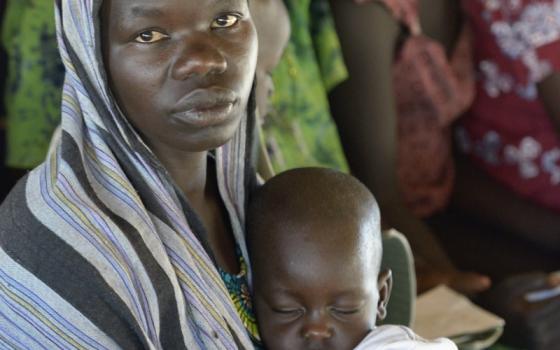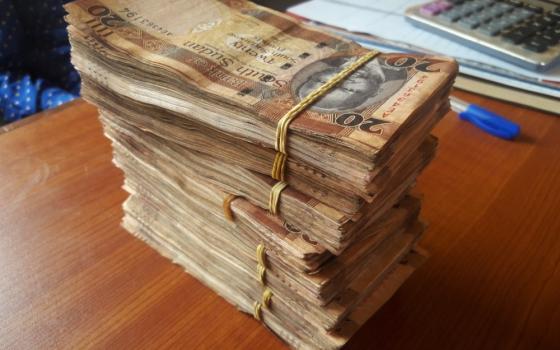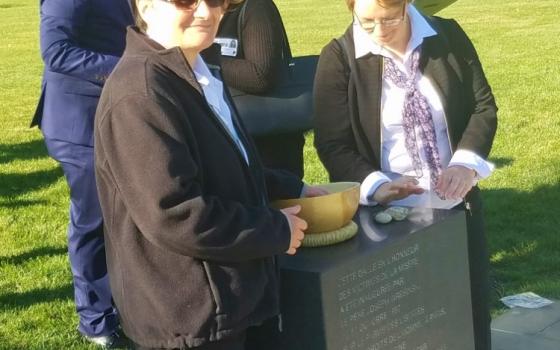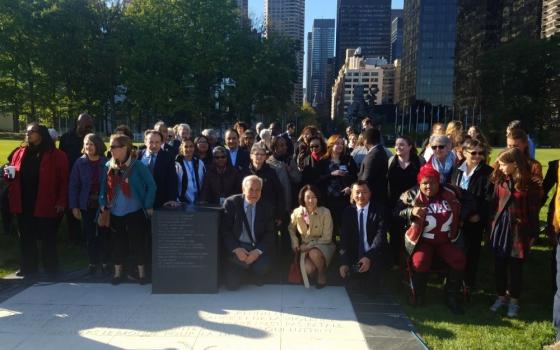When I met Constance Langoya three years ago in the South Sudanese capital of Juba, she and others were still recovering from a round of civil-war violence that shook the city to its core.
As if the challenges of poverty and reconstruction were not enough, Langoya and her neighbors in the High Jerusalem neighborhood recounted stories of gun battles, gun smuggling and other acts of violence that made day-to-day life challenging and difficult.
The violence has continued: The South Sudanese civil war now continues into its fourth year, having claimed more than 60,000 lives and leaving more than 4 million displaced, the Kenya-based East African reports.
As a Uganda citizen married to a South Sudanese man, Langoya has been able to look at events in Juba and South Sudan with something of a cool eye.
"There's little hope," said Langoya, a social worker who works as a hotel cleaner and assists with trauma-healing workshops conducted by the humanitarian network Solidarity with South Sudan and Sr. Barbara Paleczny, a Canadian School Sister of Notre Dame. The optimism of South Sudan's 2011 independence "has been swept away, like the rain," she said. "It's tough, really tough."
A key challenge is the South Sudanese economy, which by all accounts is in tatters. Many people, including government employees like teachers, have not been paid for months or even years. A decision by the South Sudanese government to devalue the local currency, the pound, to access hard currency like the U.S. dollar is causing inflation.
That means that food costs have soared. Vegetables that used to cost 2 pounds now cost 50 times that amount. The last year, Langoya told me in May, has been "really, really nasty to everyone."
People are cutting back on everything. Those who are fortunate eat two meals a day: a breakfast of tea and bread and a dinner of vegetables and beans. Meat or fish are rare treats. Those less fortunate get by on far, far less.
The World Food Programme notes that South Sudan now ranks as the 11th country in the world for child hunger: Nearly a third of children under the age of 5 are underweight. And even before the current civil war, which began in late 2013, more than half of South Sudan's populace found itself below the poverty line, the U.N. said. Now those numbers are getting worse.
In short, more and more South Sudanese are facing the ever-increasing challenges of living in poverty.
I thought of Langoya and others I met in South Sudan during a set of ceremonies marking the International Day for the Eradication of Poverty, held annually on Oct. 17. The events at the United Nations in New York included both reflections by anti-poverty activists and a commemoration at a monument on the U.N. grounds that honors those who have lived with extreme poverty.
The day has Catholic roots, grounded in the work of Polish-French Fr. Joseph Wresinski, a longtime anti-poverty activist and priest to homeless families in Paris beginning in the 1950s. His work eventually grew into the anti-poverty project called the ATD Fourth World Movement.
The U.N. began marking Oct. 17 as the International Day for the Eradication of Poverty in 1992, five years to the day after the dedication of a poverty commemoration marker near the Eiffel Tower. A replica of the stone dedicated in Paris was later laid at the U.N.
It is not lost on anyone what the price of poverty exacts on people's lives. According to the U.N., close to 800 million live in extreme poverty, and isolation and loneliness are part of that experience.
"In our neighborhoods, poverty makes children mature too quickly, and their lives are marked forever. This is deeply unjust," Angélique Jeanne, a French human rights activist, said during the Oct. 17 event. "There is no place anywhere for our children to speak of their lives without fearing that their families will be judged."
"All of us," she said, "need to commitment ourselves not to look down on anybody … and not to leave anyone alone in extreme poverty."
The attendant issue of respect also came up, as it should. Seamus Neville, a human rights defender from the United Kingdom, said it is extremely important that parents be able to bring up children so they are respected and cherished in the larger society.
Neville and others also noted the need for those who fight for justice to keep in mind that difficult but necessary truth: "Fighting for human rights, dignity and justice is a long battle." But with perseverance and effort, "we will overcome for the sake of our children."
The Catholic sisters who represent their congregations at the United Nations are part of those efforts, engaging diplomats, those affiliated with humanitarian groups and others in the long-term work of ending poverty.
The sisters do many things at the U.N. and are concerned about a host of social issues: human trafficking, the threat of nuclear war, the challenges facing women and girls. But as Sr. Elsa Muttathu, the United Nations representative of the International Presentation Association, noted after the ceremony on U.N. grounds, "All of our work is really focused on people living in poverty."
That mirrors the first and most prominent of the United Nations' long-term Sustainable Development Goals: the need to end poverty.
"This is not just another day of commemoration but really makes us look at and reflect on the root causes of poverty," she said.
Her colleague at the U.N., French Franciscan Sr. Odile Coirier, agreed, saying a day focused on the need to eradicate poverty is important because poverty remains the most critical problem in the world today.
"It's the greatest violence against humanity," Coirier said, in part because so many other problems stem from it. Commemorations like those at the U.N. are not meant to make people feel good, but are intended to be reminders of the "call" to be more active in eradicating poverty.
"It's inspiring to take time and give hope, and it's a reminder, too, that the United Nations is for the people," she said.
The sisters, of course, work out of a rich social tradition in their efforts.
"The life of Jesus is all about liberating people from poverty. Discipleship is all about walking in those footsteps," Muttathu said.
Those footsteps are best taken together, as another speaker at the U.N. event, Haitian activist Adrien Delva, noted: "I believe that as a citizen, I can do something in the context of my country's very difficult history to try to make some progress, at first individually, and then together."
That type of sentiment resonates with Langoya, who, along with many others in South Sudan continues her work despite great challenges and hardships.
"Things are tense. Nobody knows what will happen next," Langoya told me. Yet despite the challenges, she said, "We've learned to be patient. To persevere with God's grace."
[Chris Herlinger is GSR international correspondent. His email address is [email protected].]





